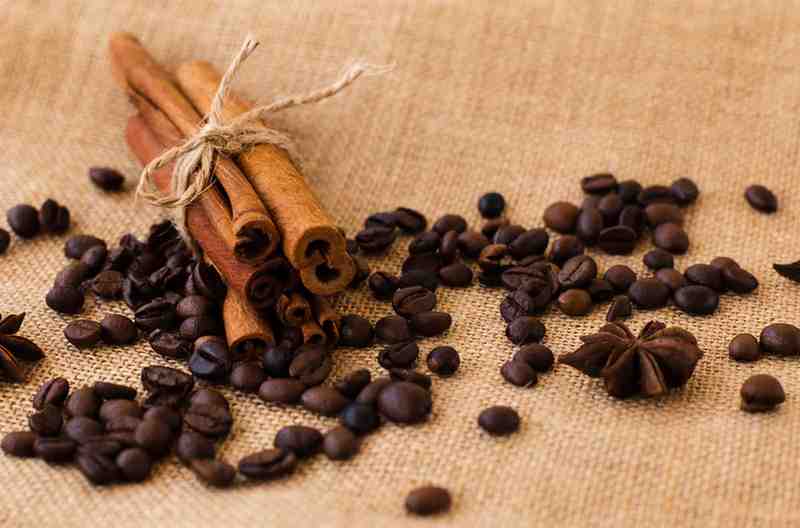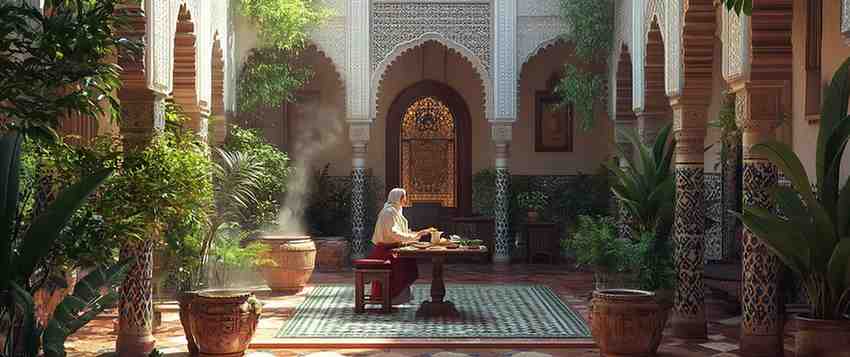Moroccan spiced coffee is a captivating blend that combines the bold richness of coffee with the warmth of traditional Moroccan spices. It offers a sensory journey that transports you to the bustling markets of Morocco, where the scent of spices fills the air. This coffee is more than just a beverage—it’s a reflection of the country’s deep-rooted traditions and love for flavor.
- Unique Flavor Profile: Moroccan spiced coffee stands out for its harmonious balance of spices like cinnamon, cardamom, and cloves.
- Cultural Significance: Spices are a cornerstone of Moroccan culture, used not only in food but in traditional remedies and rituals.
- Why It’s Unique: Unlike other spiced coffees, Moroccan versions use a specific blend that creates a rich, layered taste, offering a unique alternative to more familiar spiced coffees like chai.
History and Origins of Moroccan Spiced Coffee
Moroccan spiced coffee traces its roots back to ancient trade routes that crossed through the region, bringing an array of spices to Morocco.
Trade Influence
During the trans-Saharan trade era, merchants brought exotic spices like cardamom, cinnamon, and cloves to Moroccan ports. These spices quickly became integral to Moroccan cuisine, influencing dishes and drinks alike.
Spices and Moroccan Heritage
Spices like cinnamon, cardamom, and cloves are now deeply embedded in Moroccan culinary traditions. They are not just flavor enhancers; they symbolize Morocco’s rich heritage and its historical role as a crossroads of culture and commerce.
Cultural Integration
Moroccans developed unique methods for incorporating these spices into their daily coffee rituals. The addition of aromatic spices to coffee became a symbol of hospitality, serving as a comforting welcome to guests and a staple in social gatherings.
Traditional Ingredients for Moroccan Spiced Coffee

The quality of ingredients plays a crucial role in crafting an authentic Moroccan spiced coffee. Sourcing high-quality spices can elevate the entire experience.
Key Ingredients
- Coffee Beans: Use freshly roasted, high-quality beans for the best flavor base.
- Spices:
- Cinnamon: Adds warmth and sweetness, balancing the bitterness of coffee.
- Cardamom Pods: Imparts a citrusy, floral note, adding complexity.
- Whole Cloves: Introduces a rich, earthy depth.
- Star Anise: Adds a subtle licorice flavor that rounds out the blend.
- Nutmeg: Provides a warm, spicy kick that enhances the richness.
- Ginger: Delivers a zesty, warming note that balances the other spices.
Herbs and Botanicals
In addition to spices, several herbs are also used to enrich the coffee’s flavor:
- Apple Mint: Often added as ground leaves, it brings a refreshing, minty twist.
- Thyme: A small pinch adds a subtle herbal note without overpowering the coffee.
- Artemisia Herba-Alba (Shih): Used in some regions, this herb imparts a distinctive, slightly camphor-like flavor.
Importance of Quality
Using high-quality, whole spices and herbs rather than pre-ground versions preserves the freshness and potency of their flavors. Freshly grinding these spices just before brewing releases their essential oils, resulting in a richer, more aromatic coffee.
The Art of Brewing Moroccan Spiced Coffee
Brewing Moroccan spiced coffee requires precision and a sense of tradition. A few simple steps can make all the difference.
Step-by-Step Brewing Process
- Grind Coffee Beans Separately: Freshly grind the coffee beans to release their full flavor.
- Grind the Spices Separately: Combine cinnamon, cardamom, cloves, and other desired spices, then grind them into a fine powder.
- Use a Traditional Coffee Pot: A Moroccan coffee pot or French press works well for steeping the coffee and spices together.
- Simmer, Don’t Boil: Simmer the mixture gently to extract the full flavor of the spices without burning them.
- Strain and Serve: Strain the coffee into a cup to remove the grounds, and enjoy it while hot.
Tips for a Perfect Brew
- Balance the Spices: Adjust the spice ratios according to your taste, starting with small amounts and increasing gradually.
- Don’t Rush the Process: Allow the coffee to steep with the spices for a few minutes to develop a rich flavor.
- Avoid Common Mistakes: Avoid boiling the mixture, as it can cause bitterness and overpower the delicate spice flavors.
A Reflection of Cultural and Culinary Diversity

Moroccan spiced coffee blends the bold flavors of coffee with a mix of aromatic spices and herbs. This coffee transports you to Morocco’s lively markets, where the air is rich with the scent of cinnamon, ginger, and other spices. It is more than just a drink—it represents Morocco’s rich traditions and history. While mint tea is often seen as the country’s signature drink, spiced coffee holds a special place, offering a different yet equally captivating experience.
Each region of Morocco brings its own twist to the recipe, creating a diverse and fascinating coffee culture. This variety highlights regional differences, as locals blend their own ingredients into daily rituals. Moroccan spiced coffee is not just a favorite beverage; it symbolizes the country’s broader culinary and cultural diversity, where each cup offers a unique taste of Morocco’s heritage.
Base Recipe: The Foundation of Moroccan Spiced Coffee
Moroccan spiced coffee recipes vary by region, but most households use a base blend of ingredients. This recipe balances spices to create a complex, aromatic taste that complements the coffee’s natural richness.
Ingredients for the Base Recipe
- 350 g ground coffee: A robust, full-bodied base.
- ½ teaspoon ground cardamom: Adds a bright, citrusy note.
- ¼ teaspoon ground cloves: Contributes a warm, earthy depth.
- 2 teaspoons ground cinnamon: Brings warmth and sweetness.
- 1 teaspoon ground ginger: Adds subtle heat and zest.
- ¼ teaspoon ground nutmeg: Provides a warm, nutty balance.
- 1 ground star anise (badiane): Adds a mild licorice-like sweetness.
- 4 pinches of ground white pepper: Introduces a gentle heat.
- 30 g ground sesame seeds: Adds a nutty flavor and creaminess.
- 20 g ground anise: Brings a sweet, herbal note.
People in cities like Casablanca, Marrakech, and Rabat often use this blend. It delivers comforting flavors, perfect for mornings or for welcoming guests. However, each Moroccan region adds unique ingredients, turning the coffee into a true reflection of local tastes.
How to Prepare the Base Blend
- Grind the Coffee Beans: Use a medium grind for a balanced flavor. Freshly ground coffee enhances the richness.
- Grind the Spices Separately: Mix cardamom, cloves, cinnamon, ginger, and other spices, then grind them into a fine powder. This helps distribute the flavors evenly.
- Combine the Coffee and Spices: Blend the ground coffee with the spice mixture. Adjust the amount of spices to suit your taste.
- Brew with a French Press or Moroccan Coffee Pot: Add the coffee-spice blend to hot water, let it steep for about 5 minutes, and stir gently before straining and serving hot.
This base recipe provides a balanced taste that highlights both coffee and spices. It can be enjoyed plain or sweetened with sugar or honey, depending on your preference.
Regional Variations of Moroccan Spiced Coffee

Each Moroccan region prepares spiced coffee in its own way, creating unique flavors that reflect local traditions and ingredients.
Fez Variation: A Rich, Refined Blend
Fez, a city known for its cultural and culinary richness, adds special ingredients to its coffee:
- Chios mastic gum (Meska l’Hora): Known for its resinous, pine-like aroma, mastic gum adds depth and a hint of freshness to the coffee.
- Crushed almonds: These bring a creamy texture and a mild sweetness.
- A pinch of lavender: Lavender adds a subtle floral note, elevating the coffee’s aroma.
In Fez, people often reserve this recipe for special gatherings. It symbolizes warmth and hospitality. The mastic gum and lavender create a refined flavor that sets this blend apart from others.
Southeast Morocco: A Traditional and Medicinal Twist
In southeastern Morocco, including the Middle Atlas and the vast plains near the Sahara, people have developed a distinctive style of spiced coffee:
- White Wormwood (Artemisia Herba-Alba, Shih): This herb adds a slightly bitter taste and a camphor-like fragrance. Many value it for its digestive benefits.
- Aromatic Herbs: Some families include thyme or local mint varieties, giving the coffee a refreshing twist.
This version is popular among nomads and rural families, especially during cold months. Its warming properties and unique bitterness make it a favorite in these regions.
Mint Variations: A Cooling Addition
Across Morocco, some coffee blends include dried mint leaves for a cooling effect:
- Dried Apple Mint: Ground into a fine powder, apple mint adds a refreshing note that balances the spices. It is especially popular during summer.
Many households experiment with mint to adjust the flavor, adding herbs for a personal touch. The combination of mint and coffee creates a smooth balance, offering a fresh take on traditional spiced coffee.
Health Benefits of Moroccan Spiced Coffee
Moroccan spiced coffee offers more than just rich flavors; it also provides several health benefits due to its blend of spices and herbs.
Benefits of Key Spices
- Cinnamon: Packed with antioxidants, cinnamon can reduce inflammation and support immune health.
- Cardamom: Helps with digestion and detoxification, and supports respiratory health.
- Cloves: Cloves contain antimicrobial properties that help fight infections. They also aid digestion and oral health.
- Ginger: Eases digestive discomfort and reduces nausea. It also has anti-inflammatory properties that support overall wellness.
- Star Anise: Known for its antimicrobial properties, star anise can boost immunity and improve digestion.
Coffee’s Antioxidant Power
Coffee is a rich source of antioxidants, which protect cells from damage. When combined with spices, Moroccan spiced coffee offers a delicious and healthful boost, making it a smart choice for daily enjoyment.
Medicinal Herbs and Their Benefits
- White Wormwood: This herb aids digestion and helps with stomach issues. Its anti-inflammatory properties add to its appeal in southeastern Moroccan regions.
- Mint: Apple mint cools and refreshes, helping soothe the stomach while balancing the richness of the coffee.
Serving Suggestions and Pairings
To truly appreciate Moroccan spiced coffee, pair it with traditional Moroccan treats. These combinations can elevate the coffee’s flavors.
Traditional Pairings
- Dates: The natural sweetness of dates balances the bold, spicy notes in the coffee.
- Almond Pastries (Ghriba): These cookies add a rich, nutty contrast to the spiced brew.
- Moroccan Flatbread with Honey: A touch of honey balances the spices, offering a sweet and comforting pairing.
Tips for Serving
- Warm the Cups: Pour hot water into cups before serving to keep the coffee warm longer.
- Adjust Sweetness: Many Moroccans add sugar to balance the boldness. Honey or agave syrup are good alternatives.
- Serve in Traditional Glassware: Using small, ornate Moroccan glasses adds to the authentic experience.
FAQs About Moroccan Spiced Coffee
What is Moroccan spiced coffee made of?
Moroccan spiced coffee blends ground coffee with spices like cinnamon, cardamom, cloves, ginger, and star anise. Some regions add sesame seeds, anise, almonds, mastic gum, or herbs like mint or White Wormwood.
How does Moroccan spiced coffee differ from Turkish coffee?
Moroccan spiced coffee uses a broader range of spices, creating a more complex flavor. Turkish coffee focuses more on the coffee’s natural strength and body.
Can I use pre-ground spices for Moroccan spiced coffee?
Freshly ground spices offer the best flavor because they release essential oils. However, pre-ground spices can work if you need convenience.
What is the best way to store Moroccan coffee spices?
Store spices in airtight containers in a cool, dark place. Whole spices last longer than ground ones, so they maintain their flavor better.
Is Moroccan spiced coffee caffeinated?
Yes, Moroccan spiced coffee contains caffeine, as it uses regular coffee beans. The caffeine level depends on the beans and the brewing method.

